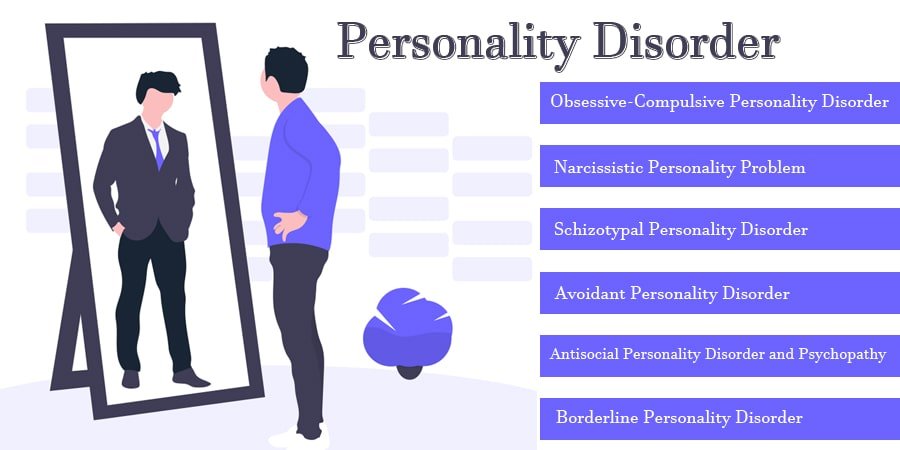Personality Disorders Symptoms, Types, and Treatment

Have you ever felt out of sync with the world, struggling to fit in despite your best efforts? You might be dealing with a personality disorder. You are not alone – millions worldwide face these complex mental health conditions daily.
Personality disorders might sound daunting, but they are incredibly fascinating. Each type is unique, from the dramatic traits of Borderline Personality Disorder to the rigid tendencies of Obsessive-Compulsive Personality Disorder. Let’s explore these often misunderstood conditions.
Signs of Personality Disorders
Personality disorders are characterized by persistent patterns of thinking, feeling, and behaving that deviate markedly from the expectations of one’s culture, cause distress or impairment, and are pervasive and inflexible. Here are the common signs associated with personality disorders:
- Extreme Mood Swings: Rapid changes in emotions, often in reaction to minor events.
- Difficulty in Relationships: Struggles to maintain stable and healthy relationships. Frequent conflicts or emotional volatility in relationships.
- Distorted Self-Image: Unstable or inaccurate self-perception. Lack of a consistent sense of self.
- Impulsive Behaviors: Acting without considering consequences. Engaging in risky activities (e.g., gambling, reckless driving, substance abuse).
- Chronic Feelings of Emptiness: Persistent sense of inner void or lack of fulfillment.
- Fear of Abandonment: Intense fear of being left alone or rejected. Clingy or overly dependent behaviors in relationships.
- Difficulty Trusting Others: Suspicion or paranoia about others’ intentions. Reluctance to confide in others due to fear of betrayal.
- Social Anxiety and Withdrawal: Avoidance of social interactions due to fear of criticism or rejection. Preference for solitude.
- Inappropriate or Intense Anger: Frequent outbursts of anger or irritability. Difficulty controlling temper.
- Perfectionism: Excessive concern with order, rules, and details. Rigid adherence to standards, leading to procrastination or incomplete tasks.
- Emotional Detachment: Limited emotional expression. Difficulty forming close emotional connections.
- Unstable Relationships: Alternating between idealizing and devaluing others. Frequent changes in friendships or romantic relationships.
- Unusual Beliefs or Perceptions: Odd or eccentric beliefs (e.g., magical thinking, belief in telepathy). Distorted perceptions of reality.
- Self-Harm or Suicidal Behavior: Engaging in self-injury (e.g., cutting, burning). Suicidal thoughts or attempts.
- Manipulative or Deceptive Behavior: Using others for personal gain. Frequent lying or deceit.
- Grandiosity: Inflated sense of self-importance. Preoccupation with fantasies of success or power.
- Lack of Empathy: Inability to recognize or respect others’ feelings. Exploitative or callous behavior.
- Chronic Dissatisfaction: Persistent unhappiness or dissatisfaction with life. Frequent feelings of inadequacy or inferiority.
- Rigid and Unyielding Attitudes: Inflexibility in thinking or behavior. Difficulty adapting to change or different viewpoints.
- Excessive Need for Admiration: Constant seeking of praise and attention. Overemphasis on one’s achievements and talents.
Types of Personality Disorders
Obsessive-Compulsive Personality Disorder (OCPD)
A person with OCPD is a perfectionist obsessed with rules, details, and deadlines. They often focus so much on details that they fail to complete tasks and struggle to manage time effectively. Their insistence on having things done their way can strain relationships, earning them the label “control freaks.” They are also frugal to the point of alarming those around them and have difficulty discarding worthless items.
Narcissistic Personality Disorder (NPD)
Individuals with NPD have an inflated sense of their abilities and crave constant praise and attention. Their social lives are often chaotic due to their arrogance, lack of empathy, and self-centered behavior. They are sensitive to criticism, easily offended, and prone to seek high-status relationships, only to discard them when expectations are not met.
Schizotypal Personality Disorder
Schizotypal Personality Disorder is characterized by strange thoughts, behaviors, and a high level of interpersonal detachment. People with this disorder might believe they can read minds or predict the future. They often have odd communication styles and peculiar behaviors, which can make social interactions challenging. While similar to schizophrenia, the symptoms are usually milder.
Avoidant Personality Disorder
Those with Avoidant Personality Disorder fear criticism, rejection, and disapproval to the extent that they avoid jobs or relationships. They often feel inferior, shy away from social situations, and are hesitant to take risks. This disorder frequently co-occurs with social anxiety disorder and is linked to the Japanese syndrome taijin kyofusho.
Antisocial Personality Disorder and Psychopathy
Antisocial Personality Disorder (APD) involves a pattern of disregard for others’ rights, marked by aggressive, impulsive, and callous behavior. Individuals with APD engage in risky and deceitful activities, often without remorse. This disorder is more common in males and younger adults, with many “aging out” of their symptoms over time.
Borderline Personality Disorder (BPD)
BPD is known for its instability in relationships and emotions. People with BPD often shift rapidly between idealizing and devaluing others. Their behavior can be impulsive and self-destructive, including gambling, reckless spending, and substance abuse. Suicidal tendencies and self-harm are also common. BPD patients frequently struggle with a consistent sense of self and may experience dramatic changes in their values and goals.
Treatment of Personality Disorders
Many individuals with personality disorders view their behaviors as normal and may not seek help on their own. However, psychotherapy has proven effective in treating these conditions.
Psychodynamic Approaches
Psychodynamic therapy helps individuals recognize the roots of their self-defeating behaviors. This approach is direct and confrontational, aiding patients in understanding their emotional responses and improving their relationships.
Cognitive Behavioral Methods
Cognitive Behavioral Therapy (CBT) focuses on modifying problematic behaviors rather than personality traits. Techniques like Dialectical Behavioral Therapy (DBT), developed by Marsha Linehan, combine CBT with mindfulness practices to help individuals manage emotions and improve interpersonal skills.
Biological Methods
Medications like antidepressants and antianxiety drugs can help manage symptoms of anxiety and depression associated with personality disorders. However, medication alone does not address the long-term effects of these conditions.
Conclusion
Personality disorders, though complex, are manageable with the right approach. Understanding the signs, types, and treatments can help you or someone you know navigate these challenges. If you suspect you have a personality disorder, seek professional help. Self-awareness and therapy can lead to a more fulfilling and harmonious life.